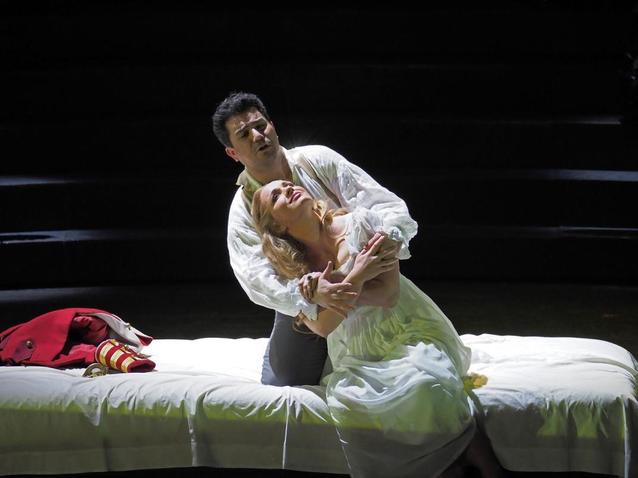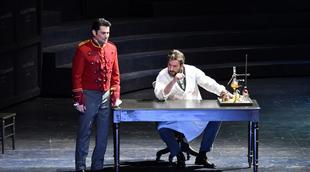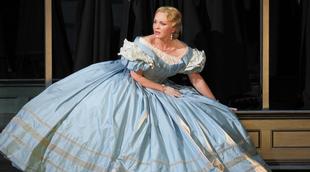 © (c) Antoni Bofill
© (c) Antoni Bofill
The stage is a space where life – or its simulation – is presented in an intense, concentrated way, where emotions and feelings guide the characters and their actions. In theatre, especially in opera, and in general in all scenic arts, the aim is always to achieve something intense. Life is tepid, the stage is always hot. If one cannot achieve an extraordinary success one must at least achieve an extraordinary failure that grabs the attention. Anything but an anodyne, non-transcendent, sad and tepid success that will pass without a trace.
This is what happened with this Roméo et Juliette by Charles Gounod, a title that hadn’t been seen at Liceu for 33 years and which had been chosen in order to mark the composer’s birth bicentenary. This one by Gounod, one of the best amongst the different musical re-elaborations of the rustproof Shakespearian tragedy, came to us as a co-production between Liceu and The Santa Fe Opera, stage directed by Stephen Lawless.
The stage director, following the trend dominating the opera world for years, decided to move the action from medieval Verona to the composer’s time. However, instead of situating the conflict between the Capulet and the Montaigu during the Franco-Prussian war, which would have been the most pertinent option, he decided – perhaps due to the influence of The Santa Fe Opera – to bring it to the North American secession war, with which Gounod had certainly nothing to do.
With accurate costumes – by Ashley Martin Davis – in the style of Gone with the wind, which made the audience fear the idea of Clark Gable stepping into the stage to sing an aria, this unusual staging might work in the United States. In Barcelona this is not the case since it doesn’t add anything to the dramatic core of the piece. Thankfully, Romeo and Juliet, as most major Shakespeare titles, survives almost everything and resisted this capricious new production as well. Nevertheless, the tedium of the production contributed to the tepidness of the success.
Musically, the performance generally navigated also in the tepidness. Katerina Tretyakova, who shares the role of Juliette with Aida Garifullina, possesses the higher register demanded by the score but doesn’t have the character nor the singing style required. Her singing, curiously, was often too acid for the sweetness of the character, but at the same time wasn’t powerful enough in the moments when strength and power were needed. Saimir Pirgu did offer a good Roméo, very correct in style, with clean and rounded high notes as well as beautiful pianissimi and sfumature. He was the one to get the best result of the night.
Amongst the various secondary characters of this opera it’s worth pointing out the good work of Tara Erraught as Stéphano, Romeo’s page, Nicola Ulivieri as Frère Laurent, David Alegret as Tybalt, Gabriel Bermúdez as Mercutio, Susanne Resmark as nanny Gertrude and Rubén Amoretti as Capulet.
The orchestra, under the baton of Josep Pons, started modestly, similarly to the choir, but got better and, although it didn’t achieve the exquisite “French” musical refinement, it obtained a good result. The orchestra finds itself at a good moment in terms of its relationship with the audience and during the turns of applause got the first prize.
Everything went more or less ok and there weren’t any musical or scenic disasters, but by the end the audience was in a hurry to leave and go home. The stage is indeed a hot place that doesn’t work well at all with tepidness.
Roméo et Juliette by Charles Gounod. Katerina Tretyakova, soprano. Saimir Pirgu, tenor. Tara Erraught, mezzosoprano. Susanne Resmark, mezzosoprano. David Alegret, tenor. Gabriel Bermúdez, baritone. Rubén Amoretti, bass. Dimitar Darlev, bass. Nicola Ulivieri, bass. Stefano Palatchi, bass. Beñat Egiarte, tenor. Isaac Galán, baritone. German Olvera, baritone. Ochestra of Gran Teatre del Liceu. Choir of Gran Teatre del Liceu. Josep Pons, conductor. Stephen Lawless, stage director. Ashley Martin Davis, scenography and costumes. Co-production by Gran Teatre del Liceu and The Santa Fe Opera. Barcelona, 19th February 2018.
the 21 of February, 2018 | Print


Comments